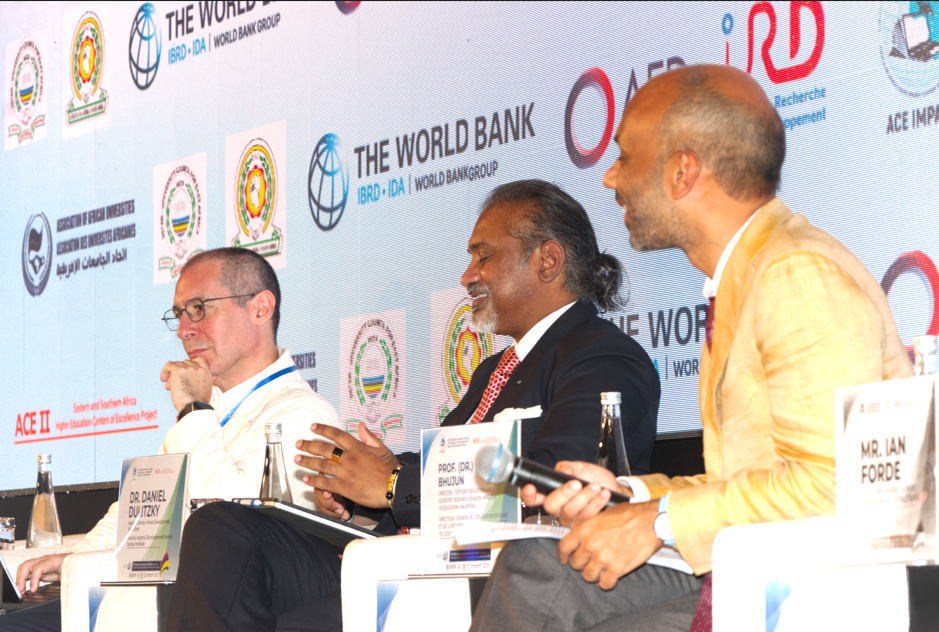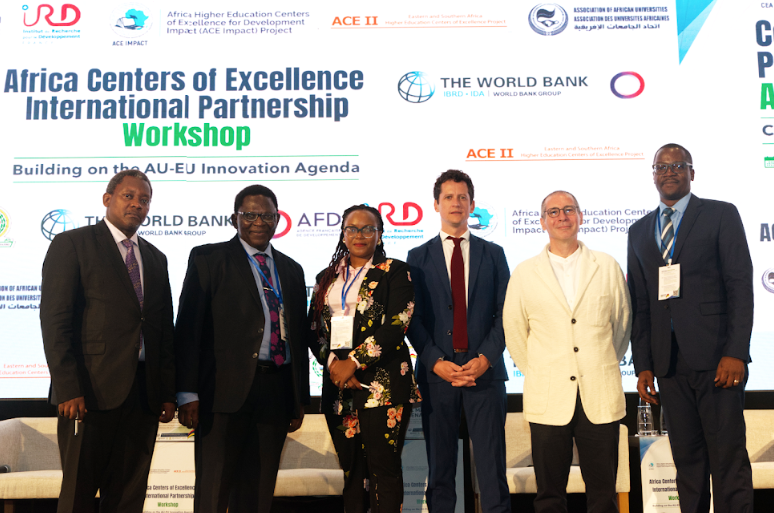The Africa Centers of Excellence (ACE) International Partnerships Workshop themed “Building Pathways Towards Sustainability through Collaborative Research and Innovation” was held in Mauritius from May 8-10, 2024. The first session was a panel discussion on the African Union (AU)/European Union (EU) innovation agenda that was jointly adopted in July 2023 by the AU and the EU. This session was given priority on the first day of the partnership workshop because of the potential opportunities that the AU/EU innovation agenda presents to the ACE Projects being implemented by 80 centers in more than 50 universities and in 20 African countries. The session held strategic significance as it addressed the pressing need to explore avenues for sustaining the ACE Projects. This involves fostering diverse partnerships, strategic collaborations, and seeking alternative financial resources to ensure the continuation of the commendable efforts of the ACEs beyond their current funding period (2025). To address the complex and interlinked challenges presented by public health, climate change, food security, energy, water, and others it is important to prioritize regional and cross-continental coordination and collaboration. It is expected that by teaming up with partners to capitalize on economies of scale, the ACE Projects can accelerate and enhance development and economic gains for the African countries involved.
About the African Union (AU) and the European Union (EU) Innovation Agenda
The AU-EU Innovation Agenda seeks to bolster collaboration in research and innovation (R&I) between the African Union (AU) and the European Union (EU), while boosting the innovative capabilities of researchers and innovators from both continents. This is hoped to be achieved by facilitating the transformation of research outcomes into concrete outputs like products, services, businesses, and employment opportunities.
The priority areas of the agenda are namely – Public Health, Green Transition, Innovation and Technology, Capacities for Science, and Cross-cutting issues. The five additional key areas in which AU-EU agreed to strengthen their cooperation are: (a) development of innovation ecosystems (b) innovation management, (c) knowledge exchange, including technology transfer, (d) access to finance, and (e) human capacity development.
Potential alignment of the AU-EU Innovation Agenda to the ACE program:
The AU-EU agenda has made it a priority to set up AU-EU Centers of Excellence, aiming to pioneer innovative institutional partnerships with significant transformative potential. The ACE project has similarly focused on establishing more than 80 centers of excellence across West, Central, East, and Southern Africa, including Djibouti.
Investing in research and innovation infrastructures as part of the AU-EU agenda aligns with the objectives of the ACE program, which prioritizes enhancing the impact and sustainability of cooperation. The ACE program has concentrated on fortifying research and innovation infrastructures by investing in top-notch laboratories, cutting-edge teaching facilities, and robust internet infrastructure and services.
The AU-EU agenda is leading the way in promoting the successful ARISE initiative, which offers funding to exceptional African researchers at mid-career and senior levels. Likewise, the ACE Project has placed a premium on investing in academic mobility and training the next generation of academics, aiming to enrich the African higher education landscape.
Panel session deliberations
Overview of the ACE Program
The session moderator, Mr. Ian Forde, a Human Development Program Leader, with the World Bank Group, explained the AU-EU Agenda and discussed its alignment with the ACE Program. The ACE Impact and ACE II Program Managers, Dr Sylvia Mkandawire, and Professor Meshack Obonyo presented an overview of the ACE Program.
The ACE is the first large-scale regional program in the Higher Education sector in Africa to be funded by the World Bank. It was described by Professor Obonyo as a series of regional Higher Education projects that aim to improve Education, Training and Applied Research at the post-graduate level in key priority fields, that include Science, Technology, Engineering, Mathematics (STEM), Agriculture, Health, Education and other related fields. “The program has provided technical and financial support to the higher education sector in Africa since 2014 (investing US$ 650 million with US$ 72 million in co-financing from AFD)”, added Professor Obonyo.
Dr. Mkandawire emphasized the significance of the 16 ACE Regional Thematic Networks initiative, which has facilitated collaborative grant applications, joint research endeavors, and publications. It has also encouraged the sharing of specialized equipment and personnel, the development of courses through co-creation, student and faculty mobility between participating institutions, organization of regional and international research symposia, summer schools, and the cultivation of robust academic and industry partnerships. Since its inception in 2014, the ACE Program has trained around 77,000 students, published 9,000 research articles, established 126 internationally accredited programs, and generated an additional revenue of US$ 171 million.
The ACE Program identifies potential synergies and partnerships in student and faculty exchanges, research and innovation collaborations, engagement with scientific advisory boards, joint seminars, and workshops, as well as partnerships with industry and non-academic stakeholders. There is an increasing interest and ample opportunities for ACEs to broaden partnerships with European Universities. ACEs have already initiated collaborations with several European universities and consortia, indicating a promising avenue for further expansion.
Contributions from the panelists
Dr. Laurent Bochereau, the European Union Science Counsellor to the African Union participated in the panel virtually to provide more information on the joint AU-EU Innovation Agenda which is a flagship Initiative of the Global Gateway Africa – Europe investment package. He encouraged the participants to learn more about the agenda from the AU-EU innovation interface.
Dr. Bochereau also expanded on the opportunities under the International Cooperation within the Horizon Europe program that has three pillars. Pillar 1 supports Excellent Science and involves the European Research Council, Marie Skłodowska-Curie and Research Infrastructures. Pillar 2 is centered on addressing Global Challenges and enhancing European Industrial Competitiveness. It backs research clusters spanning Health; Culture, Creativity, and Inclusive Society; Civil Security for Society; Digital, Industry, and Space; Climate, Energy, and Mobility; and Food, Bioeconomy, Natural Resources, Agriculture, and Environment. Pillar 3 is dedicated to fostering an Innovative Europe and encompasses the European Innovation Council and the European Institute of Innovation & Technology.
Dr. Bochereau introduced the second opportunity, known as Africa Initiative 2, featured in the second Work Program of Horizon Europe spanning 2023-2024. It builds upon the successes of the initial Africa Initiative 1 outlined in the Horizon Europe Work Program for 2021-2022. This initiative has a total budget of about 300 million euros and funds about 30 topics under calls for proposals to boost EU-Africa cooperation on Research & Innovation. In concluding, Dr. Bochereau encouraged the ACEs to visit the following useful links:
- EU-Africa Cooperation in Research and Innovation – long-term research and innovation policy priorities to strengthen Africa-Europe cooperation
- AU-EU Innovation Interface – mapping of AU-EU R&I projects to connect stakeholders and ecosystems at the interface between Africa and Europe to bring value to the impact of the Innovation Agenda
- EURAXESS Africa – information about research in Europe, opportunities for research funding, international collaboration and trans-national mobility
- Horizon Europe Funding & Tenders’ Portal – funding and calls for proposals for STI projects
- EU-Africa Global Gateway – the Africa-Europe Investment Package, on sustainable investments in infrastructure (digital, energy, transport), health, education and skills, as well as climate change and environment
Dr. Daniel Dulitzky, Regional Director of Human Development at the World Bank, emphasized the organization’s dedication to eradicating extreme poverty and fostering institutional resilience to shocks. Given the intricate interconnectedness of global issues, innovative solutions, partnerships, and sustained support are essential. Addressing today’s challenges necessitates coordinated, multi-sectoral approaches. Leveraging Africa’s demographic strengths, there’s a crucial emphasis on enhancing the delivery of health and education services. The World Bank is prioritizing support for improved teaching and learning methodologies, infrastructure development, and initiatives in health and education.
Professor Kiran Bhujun, Director of Tertiary Education & Scientific Research in the Government of Mauritius, highlighted Mauritius’ robust higher education landscape, comprising 41 institutions offering 500 accredited programs. The country boasts an impressive gross tertiary enrollment ratio of 49/50%, reflecting a thriving research and higher education environment. With one-fifth of its students hailing from international backgrounds, Mauritius’ strategies align closely with the AU/EU agenda. The government actively facilitates academic exchanges for African faculty and offers generous scholarships to African students. However, research funding remains relatively low, prompting interest in participating in regional research initiatives and expanding diaspora engagement. Mauritius also aims to achieve a 60% transition to sustainable practices.
Mauritius and Africa as a whole face several challenges, including effectively engaging collaborators, establishing databases of researchers and their interests, limited capacity in navigating fund application processes, developing micro-credit schemes, fostering unity, and collaborating with mainland Africa to address issues like coastal erosion.

Moderated Q&A session
The aim of the question-and-answer session was to facilitate an interactive discussion regarding the context, objectives, and future actions of the AU-EU Innovation Agenda. There was a particular emphasis on exploring how the partnerships formed during the week could contribute to advancing the agenda’s goals.
Professor Jan Palmowski, Secretary General of the Guild of European Research-Intensive Universities, emphasized that ARISE serves as an excellent platform and pathway for research and innovation exchanges within Africa and globally. He highlighted its significant contribution to sustainable and inclusive development, economic growth, and job creation. In the current pilot phase, ARISE supports close to 600 early- to mid-career researchers across Africa, under the guidance of 47 principal investigators, spread across 38 African countries.
Other questions revolved around strategies for academic and research institutions to enhance innovation and secure increased government funding.
Dr. Bochereau, the EU representative, highlighted the opportunities presented by the Intra Africa mobility program and reiterated aspects of the Horizon Europe initiative.
Professor Bhujun emphasized the necessity for creativity to be accompanied by prioritization. He also underscored the correlation between limited funding and the attractiveness of research. Prof. Bhujun urged higher education institutions to focus on problem-solving research and to showcase the tangible impact of their research endeavors.
